David Lumsden
About Andrew Cusack
 Writer, web designer, etc.; born in New York; educated in Argentina, Scotland, and South Africa; now based in London.
Writer, web designer, etc.; born in New York; educated in Argentina, Scotland, and South Africa; now based in London. read more
News
Blogs
Reviews & Periodicals
Arts & Design
World
France
Mitteleuropa
Knickerbockers
Argentina
The Levant
Africa
Cape of Good Hope
Netherlands
Scandinavia
Québec
India
Muscovy
Germany
Academica
Celebrating a Great Scot: David Lumsden
I can’t tell you how often I come across something and think to myself “I must ask Lumsden about that”, and then suddenly realise that no such thing is possible anymore. I only had the privilege of knowing this gentle giant of a man towards the end of his life, but am grateful even for that relatively short friendship. Below is the address given by Hugh Macpherson at the Thanksgiving Service for the Life of David Lumsden of Cushnie that took place at St. Mary’s Church, Cadogan St., London on Monday, 27th April 2009. May he rest in peace.
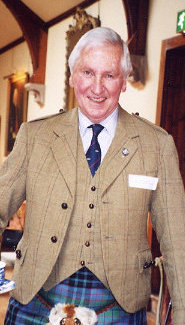 It is difficult to mark the passing of such a remarkable personality as David Lumsden. We have done with the requiems and the pibrochs and must now look forward to celebrate an extraordinary life lived to the full.
It is difficult to mark the passing of such a remarkable personality as David Lumsden. We have done with the requiems and the pibrochs and must now look forward to celebrate an extraordinary life lived to the full.
David was a man of many parts and passions. He was a renaissance man with a wide variety of interests, and if he did not know the answer to any particular question, he certainly knew where to look it up, and in a few days there would be an informative card in the post. He had a lively curiosity and sense of adventure.
Perhaps the ruling passion in his younger life was that of rowing. He rowed at Bedford School and when he went up to Jesus College Cambridge, he joined the boat club, eventually becoming Captain of Boats. There were, I think, eventually eight “oars” on the walls of his various houses. I think that David was one of the few people I know who went to Henley to actually watch the racing, and when one went into the trophy tent his name could be found on some of the trophys. The expedition to Henley was one of the fixed points of David’s year.
He travelled round the country rather like the “progress” of a monarch of old. This progress encompassed the Boat Race, Henley, the Royal Stuart Society Dinner, the Russian Ball, spring and autumn trips to Egypt, the Aboyne Games, the 1745 Commemoration, the Edinburgh Festival, and numerous balls and dinners, including of course the Sublime Society of Beef Steaks.
Rather like clubs, David and I had a “reciprocal” arrangement: When I was in Scotland I lodged with him, and when he was in London he lodged with me, and I can tell you that there were many times when I simply could not keep up with his social whirl, in fact once or twice I distinctly fell off! I remember one particularly splendid and bibulous dinner at the House of Lords at which we were decked in evening dress and clanking with all sorts of nonsense — after many attempts to hail a taxi, David turned and said to me “You know we are so drunk they won’t pick us up. We’ll have to stagger back.” And so we wound a very unsteady path back to Pimlico, shedding the odd miniature en route.
At Cambridge, David also formed a lasting friendship with Mgr. Alfred Gilbey, Catholic Chaplain to the University, who was to have a lasting influence on David’s faith and life, and, I think, introducing him to the Sovereign Military Order of Malta, where he eventually became a Knight of Honour & Devotion.
David’s faith was an important part of his life. When he was in London he would attend this church on a Sunday morning to hear the 11.30 Latin Mass, which finished conveniently near to the opening time at one of his favourite watering holes in the Kings Road. (more…)
Lumsden Requiem in Edinburgh
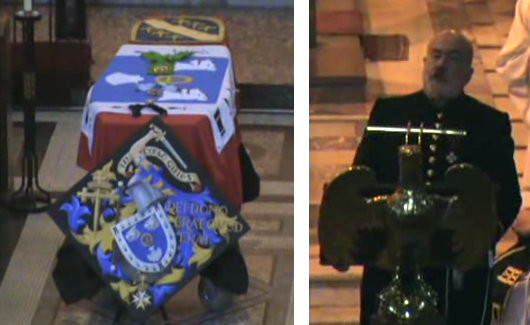
Some good Christian soul was kind enough to put most of our friend David Lumsden‘s funeral at St. Mary’s (Catholic) Cathedral in Edinburgh on YouTube. It was the first Latin requiem in the extraordinary form of the Mass held in the Cathedral for many decades — a fact which David would have particularly enjoyed. Of note is the address given by Robin Angus, embedded below, and of course Gerald Warner’s previously mentioned report should not be missed either.
‘Feudal pomp and Latin Mass at funeral of a Scottish laird’
Gerald Warner reports on the funeral of David Lumsden of Cushnie:
Thursday, September 11, 2008
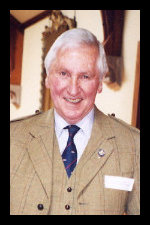 To Edinburgh yesterday, for a melancholy but magnificent and uplifting occasion: the funeral of David Lumsden of Cushnie, Garioch Pursuivant of Arms, restorer of ancient castles and Jacobite romantic. It was held in the Catholic cathedral where, for the first time since Vatican II, the Latin Tridentine Mass was sung, thanks to the permissive rules of Benedict XVI in his motuproprio Summorum Pontificum.
To Edinburgh yesterday, for a melancholy but magnificent and uplifting occasion: the funeral of David Lumsden of Cushnie, Garioch Pursuivant of Arms, restorer of ancient castles and Jacobite romantic. It was held in the Catholic cathedral where, for the first time since Vatican II, the Latin Tridentine Mass was sung, thanks to the permissive rules of Benedict XVI in his motuproprio Summorum Pontificum.
The coffin was draped in the banners of the Order of Malta and the deceased’s arms, with an heraldic hatchment and the decorations of the orders of chivalry to which he belonged. Knights of Malta and of the Constantinian Order processed behind their banner in mediaeval robes. The congregation was filled with peers, chieftains, lairds and splendid eccentrics, the pews awash with tartan. One of the tail-coated ushers was the grandson of a papal marquis. Robin Angus, whose day job is venture capitalist, dressed in the uniform of a papal Knight of St Sylvester, delivered a moving panegyric.
This occasion was a potent reminder of an alternative Scotland, a different pulse from the vulgar, mean-minded, politically correct clones in the abysmal Scottish parliament at Holyrood. It was shamelessly feudal, aristocratic and colourful. Evelyn Waugh would have loved it; Harriet Harridan would have burst her stays. It was reminiscent of the scene in Waugh’s Sword of Honour when, at the funeral of old Mr Crouchback, the members of ancient Catholic Recusant families murmur their sonorous names while the narrator, parodying a wartime poster, concludes: “Their journey was really necessary.”
At the subsequent reception, Lady Mar, whose personal herald David was and who came top of the ballot for the 92 surviving hereditary peers in the House of Lords, was pointedly addressed by Jacobites as “Your Grace”. This was because, although the British state recognises her as 30th Countess of Mar, her ancestor who led the Jacobite Rising of 1715 was created Duke of Mar by the exiled Stuart King James VIII.
Only a few of these Jacobite peerages created by the Stuarts in exile have heirs today. Now that such hereditary peerages no longer bestow an automatic seat in Parliament, it would be a gracious gesture for the Crown to recognise them and so heal old historical wounds. There is a precedent: Spain has recognised the titles of nobility created by the Carlist claimants in exile – Carlism being the Spanish equivalent of Jacobitism.
The dry-as-dust forms issued by government departments are normally very boring; but the most romantic document available online is issued by the Spanish Ministry of Justice, entitled Solicitud de Titulo Nobiliario por: Rehabilitacion/Reconocimiento de Titulo Carlista. It is the formal application for recognition of a title of nobility conferred by the Carlist kings in exile from 1833 to 1936. David Lumsden of Cushnie (RIP) would have appreciated it.
David Lumsden of Cushnie, 1933-2008
Garioch Pursuivant of Arms, sometime Baron of Cushnie-Lumsden, Knight of Malta, Patron of the Aboyne Highland Games

It was with great sadness that I learned this morning of the death of David Lumsden. He was an exceptionally genial and affable man, and was relied on to provide good company at many events, from balls to Sunday lunches and everything in between. But David was generous not only with his good company but with his patronage, as is attested to by the countless organizations he helped and guided. Here was a man who was generous of spirit. David’s death came very suddenly yesterday afternoon in his hotel room at the annual conference of the 1745 Association, of which he was president. Just last Sunday he had attended the traditional Mass at St. Andrew’s, Ravelston in Edinburgh, where a friend described him as “looking as hale and hearty as ever”.
David Gordon Allen d’Aldecamb Lumsden of Cushnie, sometime Baron of Cushnie-Lumsden, was born on 25 May in 1933 in Quetta, Baluchistan in the Empire of India. He was the son of Henry Gordon Strange Lumsden, a Major in the Royal Scots, of Nocton Hall, Lincolnshire and Sydney Mary, only child of Brigadier-General Charles Allen Elliot.
He was educated at Allhallows, Devon, Bedford School, and at Jesus College, Cambridge before serving in the Territorial Army with the London Scottish while working at British American Tobacco. He was a Knight of the Order of Malta, as well as of the Constantinian Order, and was Patron of the Aboyne Highland Games. David enthusiastically served as Garioch Pursuivant to the Chief of the Name and Arms of Mar (presently Margaret of Mar, the 30th Countess of Mar), one of the four surviving private officers of arms in Scotland recognised by the Court of the Lord Lyon.

Lumsden with friends, at the Aboyne Highland Games.
David co-founded the Castles of Scotland Preservation Trust and the Scottish Historic Organs Trust and was President of the Scottish Military History Society. In addition to his Magister Artium from Cambridge, he was a Fellow of the Society of Antiquaries of Scotland. He was on the council of The Admiral the Viscount Keppel Association and was one of the patrons of the famous Russian Summer Ball in London. He was Convenor of the Monarchist League of Scotland and was on the council of the Royal Stuart Society.
In the realm of sport, he was a keen shot and had rowed at Cambridge, in addition to his interest in sailing and riding.
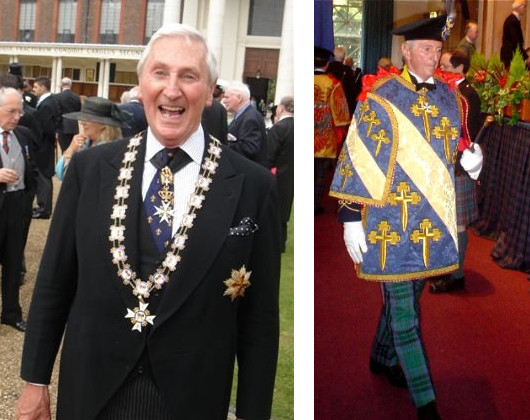
Left: Representing the Royal Stuart Society at the Henry IX commemoration at the Royal Hospital Chelsea. Right: In his capacity as Garioch Pursuivant of Arms, at the XXVIIth International Congress of Genealogical and Heraldic Sciences in 2006.
David had a passion for architecture, and especially that of his native Scotland. Returning in 1970 after a spell in Africa, he undertook the restoration of two family properties: Cushnie House, built in 1688 by Alexander Lumsden and Tillycairn Castle, built in 1540 by Matthew Lumsden. He later went on to restore Leithen Lodge at Innerleithen, an 1880s shooting lodge built in a distinctly Scottish take on the Arts & Crafts tradition. Under the auspices of the Castles of Scotland Preservation Trust, in 1994 he oversaw the restoration of Liberton Tower just south of the Royal Observatory in Edinburgh.
“David was a unique man possessed of an insatiable love of life and learning,” his friend Rafe Heydel-Mankoo said. “He will be deeply missed and fondly remembered by those fortunate enough to have met him.”
“David was at the centre of so many things, and brought together so many different people,” said Lorna Angus, the wife of Robin Angus. “He could bring life to any gathering and he made so many good things possible.”
Robin Angus, meanwhile, said that David Lumsden “personified a world of precious things — things which are imperilled, but which never seemed imperilled when he was there.”
“David no longer visibly with us is unimaginable,” Robin continued. “What his friends must now do is keep the flame, and — as he did — pass it on to others with the same generous wisdom. He was the soul of old Scotland. I hope that, in Heaven, Raeburn will make amends for what the centuries did not allow, and paint his portrait.”
While I wholeheartedly agree with Robin, it must be said that those who were blessed to know David are left with a portrait of him in our hearts and minds far greater than even the brush of Raeburn could achieve.
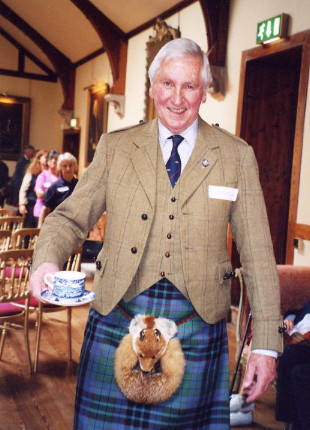
David Gordon Allen d’Aldecamb Lumsden
of Cushnie
1933–2008
“… hold fast to that which is good.”
— 1.Thess 5:21
Requiem aeternum dona eis Domine:
et lux perpetua luceat eis.
Requiescat in pace.
Search
Instagram: @andcusack
Click here for my Instagram photos.Most Recent Posts
- Sag Harbor Cinema March 26, 2025
- Teutonic Takeover March 10, 2025
- Katalin Bánffy-Jelen, R.I.P. March 3, 2025
- Substack Cusackiensis March 3, 2025
- In the Courts of the Lord February 13, 2025
Most Recent Comments
Book Wishlist
Monthly Archives
Categories


